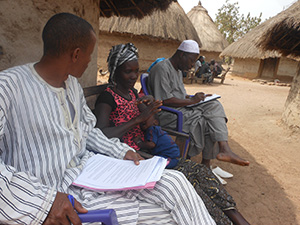
In West Africa, understanding the local context is an important first step towards building more resilient communities to mitigate the impact of the Ebola emergency on food security and nutrition. Prior to starting country activities in Guinea, SPRING’s social and behavior change communication (SBCC) experts worked with team members from Winrock International—SPRING’s implementing partner in Guinea—and Institut Supérieur Agronomique et Vétérinarie (ISAV) in February 2016 to better understand the local context in Faranah. A formative research assessment explored local hygiene behaviors and examined feeding practices for children 6-23 months old and for pregnant and lactating mothers, to inform our work in developing nutrition-related SBCC communication strategies.
From 16 potential nutrient-dense agricultural products, we chose two for inclusion in our formative assessment: sweet potato leaves, which are high in vitamin A and cowpeas for their high protein content. We wanted to explore how these foods could fill observed nutritional gaps, especially during the first 1,000 days. We also evaluated some hygiene-related activities, like handwashing with soap.
Through interviews and site observations in two representative communities in Faranah, our team examined the extent to which sweet potato leaves and cowpeas are included in food for children aged 6 to 23 months and what influences those decisions. Our initial findings showed both are often included in diets, but prices and availability during the dry season affects the extent to which they are included.
Grandmothers have a strong influence on how children are fed. Other strong influencers are the availability and price of diverse foods during the different seasons. Additionally, some families did not know how to prepare these foods for young children.
In addition, our team evaluated key maternal infant and young child nutrition (MIYCN) and hygiene behaviors. Handwashing with soap was a particularly important issue, given Ebola prevention efforts in the area. We found that while there was knowledge about the importance of handwashing and willingness to increase the practice, the cost of soap can be a barrier and plastic water bottles used to make tippy taps are difficult for families to get. Young children often do not have access to clean play spaces and many households did not have access to latrines. This formative assessment will inform our SBCC approach as we promote key behaviors related to production, storage, preparation, and consumption of sweet potato leaves and cowpeas at household and village levels, and promote good hygiene practices. Engaging demonstrations and community video will be used to demonstrate how tippy taps can be made from locally available substitutes, like gourds and ceramic bowls.